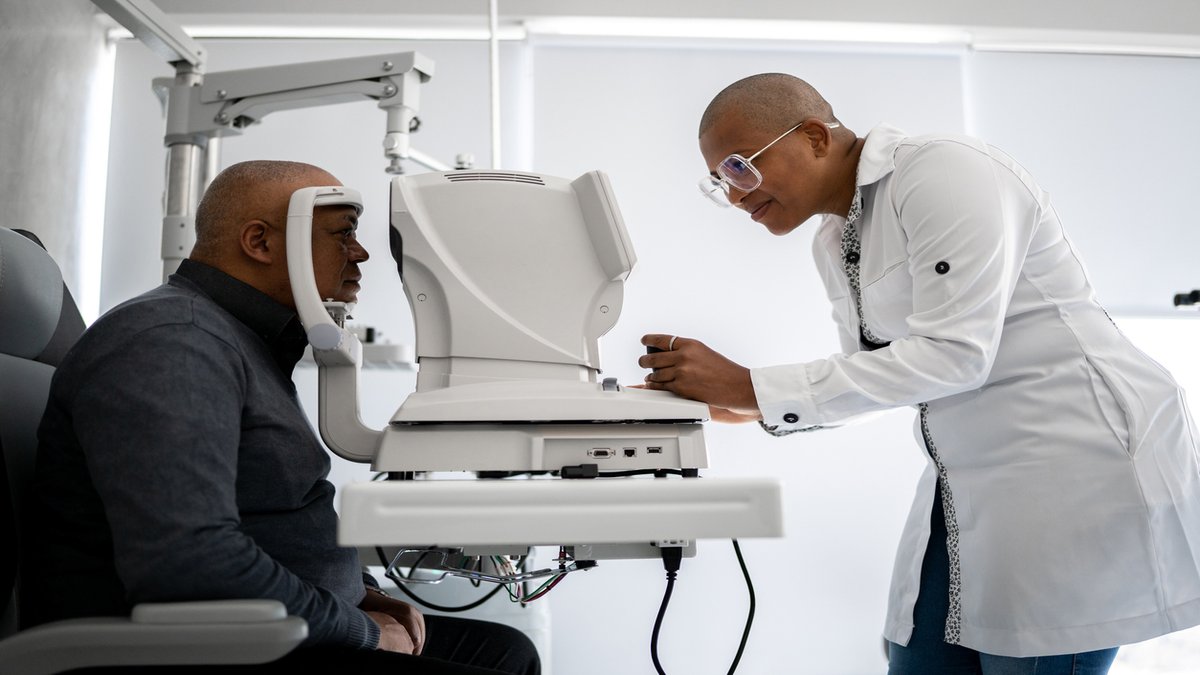
To maintain your eye health and vision, it’s important to get regular dilated eye exams from a qualified eye care provider. We have information and links to help you find a doctor and get appropriate eye care.
SEARCH FOR A PROVIDER
Your primary care physician or any other doctor who made your diagnosis may have recommendations. Ideally, you want a doctor or medical practice experienced in treating glaucoma.
The links above are for third-party applications that allow you to search for a doctor. They not affiliated with, or endorsed by, BrightFocus Foundation or our website. BrightFocus Foundation does not endorse or recommend any individual providers listed there, nor do we verify qualifications, licenses, practice emphases, or suitability of the providers. Please see our disclaimer related to third-party sites for more information.
It’s important to get regular dilated eye exams from a qualified eye care provider, especially as you age or if you have any risk factors for glaucoma. That’s because glaucoma usually shows no symptoms until you already have some vision loss—which cannot be regained.
Learn more about the different types of eye doctors and how to choose a doctor for the right eye care for you. We also have information and links to help you find a doctor.
Types of Eye Care Providers
Opticians, optometrists, and ophthalmologists have different skills, experience, and levels of training to provide eye care. Therefore, some may be better equipped and prepared to properly detect and manage glaucoma than others. Read more about each type so you can decide which is right for you.
Opticians
An optician:
- Is not a physician
- Is trained to design, fit, and dispense devices to correct your eyesight, including:
- Glasses
- Contact lenses
- Low vision aids
- Ophthalmic prosthetics
- Does not diagnose or treat eye disease
- Has training that may consist of a two-year associate’s degree, a four-year degree, or on-the-job training
- If registered with the Society to Advance Opticianry (SAO), a national credentialing body, has a four-year college degree in optical science and advanced certification and/or state licenses in fitting and dispensing eyewear and contact lenses
Optometrists
An optometrist:
- Is a licensed doctor: a Doctor of Optometry (OD)
- Is an eye doctor who examines patients to make certain that:
- They can see well
- Their eyes work properly together and are healthy and free of disease
- Diagnoses, manages, and treats vision problems and eye diseases
- Has an undergraduate degree followed by four years of optometry school
- May have completed a one- to two-year residency in subspecialty areas related to glaucoma and macular degeneration such as:
- Geriatric eye care
- Neuro-optometry
- Ocular disease
Ophthalmologists
An ophthalmologist:
- Is a licensed physician: a Doctor of Medicine (MD)
- Is an eye doctor who:
- Diagnoses, manages, and treats vision problems and eye diseases
- Is trained to perform eye surgery
- Has the greatest amount of specialized training on the anatomy, physiology, and diseases of the eye
- Has an undergraduate degree followed by:
- Four years of medical school
- One year of internship
- Three years of ophthalmology residency
- May be board certified by the American Board of Ophthalmology or the American Osteopathic Board of Ophthalmology and Otolaryngology
Learn more about finding the right eye doctor for your needs.
Getting Appropriate Eye Care
You and your eye doctor should discuss how often to have your comprehensive, dilated eye exam, based on your medical history and risk factors. The American Optometric Association recommends a comprehensive eye exam:
- Every two years for adults ages 18 to 60
- Annually for seniors aged 61 and older
Ask your primary care physician or eye doctor for recommendations for an eye doctor with experience in treating glaucoma. If you have advanced glaucoma, you may need an ophthalmologic glaucoma specialist. Be sure to ask questions before making an appointment so that you get the best possible eye care.
About BrightFocus Foundation
BrightFocus Foundation is a premier global nonprofit funder of research to defeat Alzheimer’s, macular degeneration, and glaucoma. Through its flagship research programs — Alzheimer’s Disease Research, Macular Degeneration Research, and National Glaucoma Research— the Foundation has awarded nearly $300 million in groundbreaking research funding over the past 51 years and shares the latest research findings, expert information, and resources to empower the millions impacted by these devastating diseases. Learn more at brightfocus.org.
Disclaimer: The information provided here is a public service of BrightFocus Foundation and is not intended to constitute medical advice. Please consult your physician for personalized medical, dietary, and/or exercise advice. Any medications or supplements should only be taken under medical supervision. BrightFocus Foundation does not endorse any medical products or therapies.
- Find a Provider









